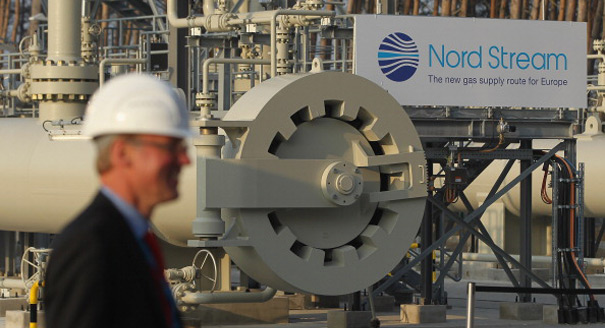Angela Merkel has won much praise for her policy toward Russia and Ukraine. The German chancellor has kept the EU united over continuing the sanctions that were imposed on Russia for its March 2014 annexation of Crimea and interference in eastern Ukraine. She has repeatedly hosted the president and prime minister of Ukraine. And she has stuck to the principle that the sanctions must continue until the Minsk accord, which she negotiated with Russia President Vladimir Putin in February 2015 with the aim of ending the fighting in Ukraine’s east, is fully implemented.
But inside her coalition, the center-left Social Democrats are taking a different view that shows how the party is highly reluctant to ditch Ostpolitik, the defining strategy of rapprochement that has shaped Germany’s relations with Russia since the 1970s.
The urge to revive the German-Russian relationship is being encouraged by Sigmar Gabriel, the leader of the Social Democrats, with support from Frank-Walter Steinmeier, Germany’s Social Democratic foreign minister. Gabriel called for the lifting of sanctions on Russia in early October. Then, during a visit to Moscow on October 28, when he met Putin and Gazprom chief Alexey Miller, he lamented the sorry state of relations between Berlin and Moscow.
Gabriel said he couldn’t understand how the “development of our two nations went in completely different directions,” according to the Kremlin’s transcript of the meeting. As for Ukraine, he added, “I feel that the situation surrounding Ukraine is most likely a symptom rather than the cause of the problems that have occurred.” He blamed “parties involved in Europe and the US who benefit from the continuation of this conflict, rather than its resolution.”
Gabriel went on to give a spirited defense of the Nord Stream 2 project. This involves the extension of the first Nord Stream gas pipeline network, which was built under the Baltic Sea and allowed Gazprom to transmit gas directly from Russia to Germany. That original project was championed by Merkel’s Social Democratic predecessor as chancellor, Gerhard Schröder. He is now on Gazprom’s payroll.
Gazprom’s ultimate goal is to end Russia’s reliance on Ukraine as its main gas transit route to its lucrative European markets. Russia supplied about 30 percent of Europe’s gas consumption in 2013. About half of Russian gas to Europe crosses Ukraine. The addition of Nord Stream 2 would mean a loss for Ukraine of €1.8 billion ($2 billion) a year in transit fees.
Critics of the plan, led by the Baltic states, Poland, and other Central European countries, recently sent a letter to the European Commission opposing Nord Stream 2. They argued that the new pipeline would contravene the EU’s Third Energy Package, besides locking Gazprom into the European market in a way that could undermine Europe’s energy security and the EU’s proposed energy union.
The essence of the Third Energy Package is so-called unbundling, whereby the supply and transportation of energy must be separated and third-party access to the market must be allowed. The aim is to promote competition and create a liberalized energy market throughout the EU. In 2014, the commission’s rules persuaded Gazprom to abandon the South Stream project, which would have linked Russia to Southeastern Europe via a pipeline under the Black Sea, because it didn’t meet those requirements. Why, then, can’t the commission apply the same principles for Nord Stream 2?
Gabriel seems determined to keep the commission at bay. He told Putin that Nord Stream 2 would remain “under the competence of the German authorities, if possible. So if we can do this, then opportunities for external meddling will be limited. . . . We will limit the possibility of political interference in this project.”
Maroš Šefčovič, the vice president of the European Commission who is in charge of the energy union, has been vague about Nord Stream 2’s compatibility with the Third Energy Package. But as a former Slovak diplomat, he must know that most of Central Europe would be vulnerable if Ukraine were no longer used as a transit route. Ukraine’s gas comes from the pipeline that crosses its territory. Germany too would become more dependent on Russian gas, which has accounted for some 30 percent of Germany’s gas needs in recent years.
Germany also wants to offer Russia a special investment and energy arrangement to prevent any further political and economic fallout between Moscow and Kiev when the Deep and Comprehensive Free Trade Agreement between the EU and Ukraine comes into force in January 2016. Under pressure from Russia, the EU earlier this year postponed the implementation of the deal. Steinmeier proposed the idea of investment and energy concessions to Moscow to Cecilia Malmström, the EU’s trade commissioner, to “respond to Russia’s wishes and begin a closer exchange of views on energy and investment protection issues.”
In addition, Berlin supports the idea of “co-operation between the EU and the Eurasian Economic Union [EEU], in combination with a peaceful solution in eastern Ukraine.” The Russian-led EEU also includes Belarus, Kazakhstan, and Armenia.
Berlin’s support for Nord Stream 2 and the EEU is winning it few friends among its Eastern neighbors. They fear that Germany’s longing for Ostpolitik would be to their disadvantage as they try to wean themselves off Russian energy and finally break free from Russian meddling.


-1.png)

-2.png)

.png)